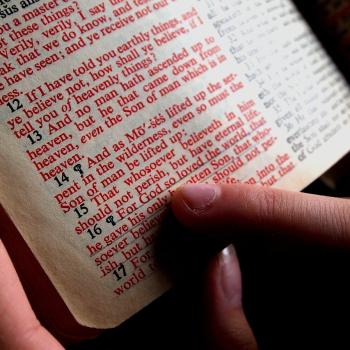Like a label, or identifying yourself...
Someone else can do that.
How do you self-identify as a person of faith?
I'm a Christian.
I actually heard these Jesus stories when I was young, like the cross and resurrection and "come follow me," and I believed from an early age. Jesus was utterly compelling and believable and worth following, whatever that looked like for a kid. So I didn't come into this through a denomination or a dogma or a systematic theology; I came in through my own experience and believing trust that there's a God who loved me, and loves us, and calls us to a great life—a full, overflowing, vital life. It's actually just this last year that I'm more in tune with that.
So when people are like "well you didn't say it this way," I don't know what you're talking about. I guess I don't measure up to these eleven propositions or these nine theological statements. There is this love that flows among all of us and that is our job, to be channels and vessels of it to others, and this is what Jesus told us to do, and when he could have summarized it in a million different ways, he said "love your neighbor, love God." So that's sort of how I came into it; so I still am sort of floating along in this particular river and it's good and it's worth it.
Staying with Jesus for a minute—as a Christian, as somebody who has written a book called Love Wins that made a nod toward Christian Universalism by suggesting that there might not be a hell and that we all might get into heaven after all—do you still believe that Jesus is uniquely salvific? For you, is Jesus the way, or a way?
Yeah, I take very seriously Jesus announcing that he has done something for all of humanity. Paul talks about the reconciliation of all things, and Jesus talks about the restoration of all things, and the New Testament says that he holds all things together. So, there is a particularness to his universality, but how that exactly plays out, I have no idea.
But I don't see him somewhere other than present with all of us, and that is a great mystery. I think a lot of people in the Christian faith think Jesus is somewhere other than in the midst of all humanity, so you have to get people to him or get him to people. That isn't how he talked, and I don't think it's how the first Christians talked. When Paul is writing "His blood is shed on the cross for the reconciliation of all things in heaven and on earth," that's about as expansive as it gets.
So I want to go back to science and God, for a minute. I was having lunch recently with some friends of mine, one of whom is a former Presbyterian minister, who is now an atheist, or a "free thinker" as he prefers to call himself. He was saying that he just doesn't see the need for the supernatural. For him, science, the world, is so amazing in and of itself; when you look up at the stars, why do you have to say, "Isn't God so great that He created that?" Why can't you just look up at the stars and say, "That's amazing"? What would you say to the atheist or skeptic about why we make that move to God at all?
Because when a tsunami hits, and it wipes out thousands of innocent people, our fellow humans, does this man say "that's awesome"? Or when you're in a village in sub-Saharan Africa, where 27 percent of the people are HIV positive, does he say "isn't this awesome"? So, creation is awesome, but if creation is God, there are some things that are really wrong. The Hebrew view is we don't say God is the mountain, the volcano, the pasta, the sunset, the embrace; it's about creation that is free to actually be a creation. Which means there's all this potential for horribleness. That's probably how I'd begin to answer it.
I also secondly would say it depends on what you mean by "miracle." The whole thing is miraculous, and that is where his critique is really powerful. He's simply saying, "I don't need to go to mythological supernaturalism to have wonder and awe." And, he's right; I actually think his thinking is quite biblical. I would also argue that if this is a retired pastor, who sounds like a brilliant, interesting man, I would be interested to know who hurt him. Because my experience has been that intellectual issues often have their roots . . . he may be not believing in a God he experienced in a denominational setting. I probably don't believe in that God either. He may actually have rejected things that we should reject.
:::page break:::So, one of my favorite contemplatives, John Philip Newell, recently posted on Facebook: " The great spiritual quest of the Western world today is not about belief in God. It is about the experience of God. It is about seeking to encounter Sacredness now—in the earth, in our relationships with one another, and in the simple disciplines of contemplative practice." You also seem to place experience as central to knowing God. Can you say a bit more about that? And more specifically, how do we do this? How do we engage experience? How do we move from belief to experience?





